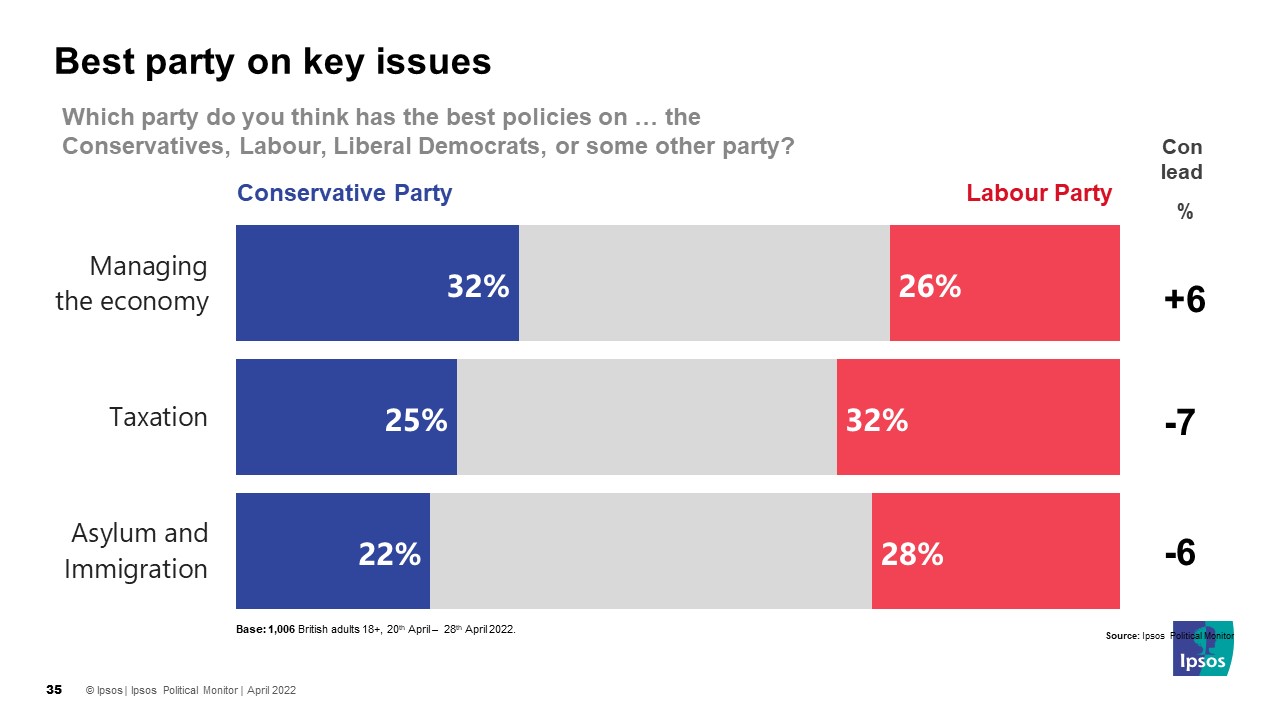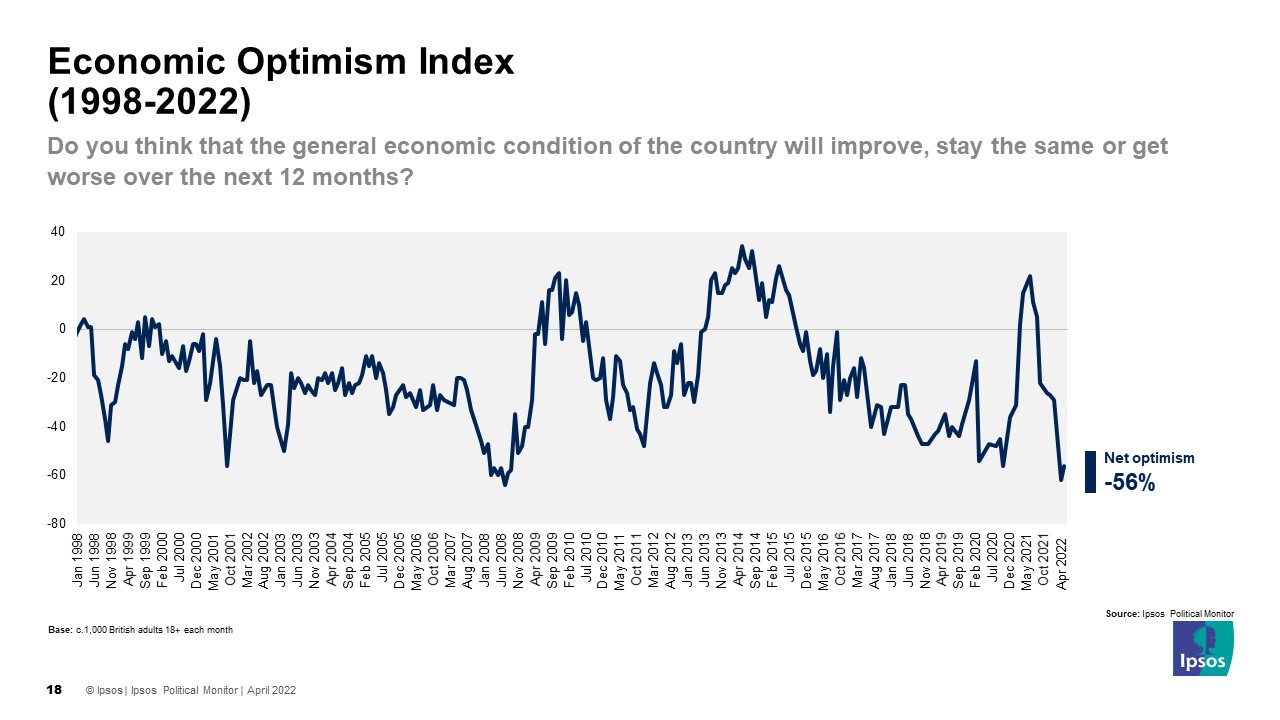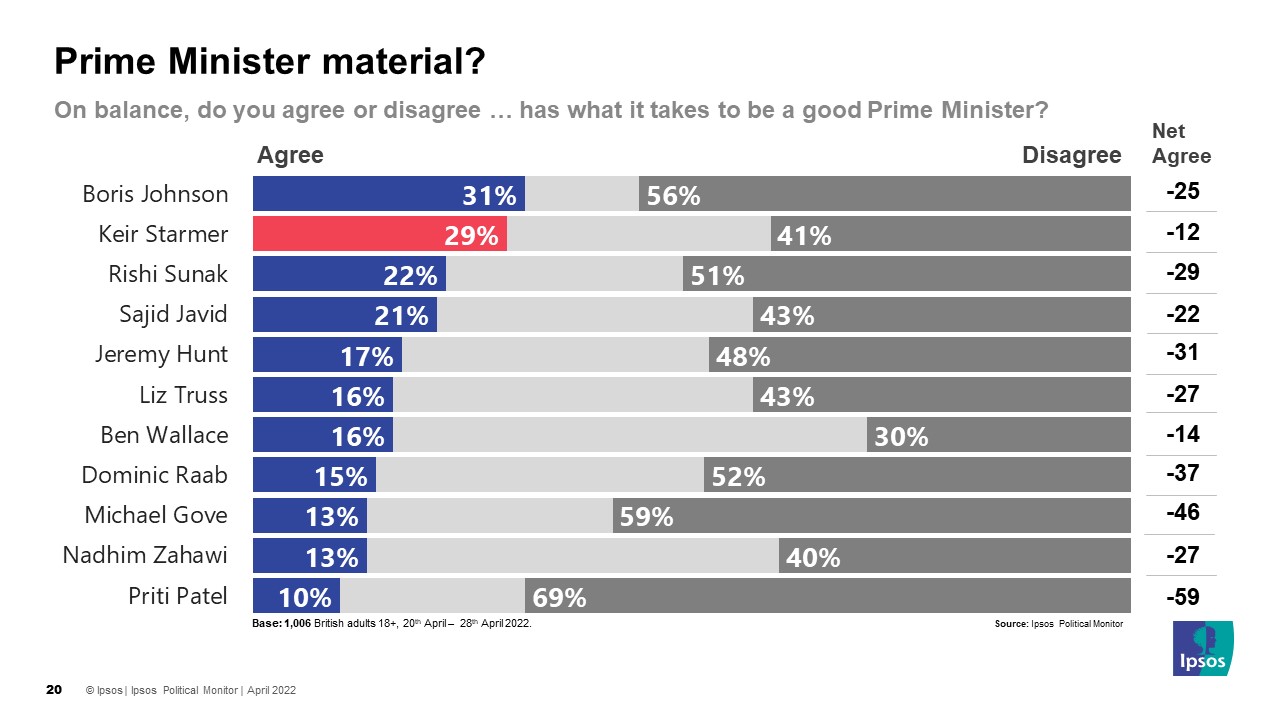Conservatives' lead on the economy falls as Labour seen as best party on tax
- Public support to see Boris Johnson replaced falls but most still dissatisfied
- Rishi Sunak’s poll ratings fall amidst public concern about the cost of living and weak economic optimism
- Yet public yet to be convinced that Labour is ready for government or Keir Starmer is ready to be Prime Minister
The latest Ipsos Political Monitor shows a reduced Conservative lead over Labour on handling the economy, with Labour seen as the party with the best policies on tax. The public are less inclined to want Boris Johnson to be replaced than in January, though a majority still do so. Meanwhile, Rishi Sunak’s ratings as a potential PM have fallen sharply amidst continued economic pessimism and public concern about the cost of living. However, despite this, Labour are yet to convince the public they are ready for government or that Keir Starmer is ready to be Prime Minister.
 Key findings include:
Key findings include:
- Labour are seen as the best party on taxation by a margin of 32% to 25% over the Conservatives. This is a Labour lead of 7 points (and their best result since 2012), whereas at the last General Election the Conservatives led Labour +12 (38% vs 26%).
- The Conservatives still retain a lead on ‘managing the economy’ overall (+6). However, this lead has fallen from +18 in October 2020 and +24 at the last General Election. This is the lowest Conservative lead since March 2013 when the two parties were neck and neck.
- Labour leads the Conservatives +6 points on managing asylum and immigration (28% vs 22%). Labour had a similar lead of +4 points in October 2020 but at the December 2019 General Election the Conservatives led +11 and they led +20 in April 2017.
Should the Conservatives / Labour change their leader?
- 55% of the public think the Conservatives should change their leader before the next General Election (-6 points from January) whereas 26% disagree (+3). Whilst improving from January, 55% is still worse than views towards Theresa May in 2017-18 or David Cameron 2014-15.
- Meanwhile 36% think Labour should change their leader before the next General Election, (-1 point from January) and 35% disagree (-3). The 36% who agree is lower than any recorded rating for Jeremy Corbyn whilst he was Labour leader.
Looking ahead to the next election
- 32% think the Conservatives deserve to be re-elected at the next general election (+4 pts from January and 51% disagree (-5pts).
- 33% of the public think Labour is ready to form the next government (-5 pts from January) and 46% disagree (+6 points).
- 34% think Keir Starmer is ready to be PM (-4 pts from January) and 48% disagree (+4 pts).
Economic Optimism
- 70% of Britons expect the economy to worsen in the next 12 months (-6 points from March) and just 14% expect it to improve (no change). This means the Ipsos Economic Optimism Index has improved slightly since March but it still stands at -56 rather than -62. -56 is the weakest economic optimism score since October 2020 whereas -62 had been the weakest since the 2008 financial crash.

Leadership satisfaction
- Public dissatisfaction with Boris Johnson has increased slightly this month. 30% are satisfied with the job the Prime Minister is doing (down 1 point from March), 63% are dissatisfied (+4).
- Most Conservative voters retain confidence in the Prime Minister. 69% of Conservative voters are satisfied with the job he is doing (little change from March) and 24% are dissatisfied.
- Figures for the government overall are similar. 30% of the public overall are satisfied with the job the government is doing running the country little change from March) and 61% are dissatisfied.
- Public satisfaction with Keir Starmer as Labour leader has slightly worsened. 32% are satisfied with the job he is doing (-1 point) and 46% are dissatisfied (+3).
- However, his net rating of -14 is better than Johnson’s -33. However, Keir Starmer’s ratings with Labour voters are worse than Johnson’s with Conservatives. 55% of Labour voters are satisfied with Starmer (-3 points) with 31% dissatisfied (+5 points). This means Starmer’s net rating with Labour voters is +24 whereas Johnson’s with Conservatives is +45.
Who has what it takes to be Prime Minister?
- 31% think Boris Johnson has what it takes to be a good PM (+8 points from January), 56% disagree (-8 points). This means his net rating of -25 has recovered somewhat from -41 in January. It is similar to the -21 recorded in November 2021 (and to Theresa May’s score in March 2019) but worse than his +2 recorded last June.
- 29% think Keir Starmer has what it takes (-3 points from January) whereas 41% disagree (+5). His net rating now stands at -12 now rather than -4 in January, though better than his -24 registered last June.
- Rishi Sunak’s ratings on this measure have fallen sharply to -29 now from -1 in January and +7 last June. 22% think the Chancellor has what it takes (-11 points from January) and 51% disagree (+17 points).
- Few other leading Conservatives stand out among the public as a potential PM at the moment:
- 21% think Sajid Javid has what it takes, 43% disagree
- 16% think Liz Truss has what it takes, 43% disagree
- 16% think Ben Wallace has what it takes, 30% disagree
- 17% think Jeremy Hunt has what it takes, 48% disagree
- 13% think Nadhim Zahawi has what it takes, 40% disagree
- 15% think Dominic Raab has what it takes, 52% disagree
- 13% think Michael Gove has what it takes, 59% disagree
- 10% think Priti Patel has what it takes, 69% disagree

What would be important in local elections?
When asked which of the following would be ‘very important’ to you when deciding who to vote for in local elections on the 5th May people point to both national and local factors (if no local elections were happening in their area, people were asked to think about what would be important if there were):
- What local political parties are promising to do in your area 55%
- How well the local council has run your area over the past few years 55%
- Party policies on national issues 51%
- How well the UK Government has run the country over the past few years 46%
- Views about candidates standing in local elections 46%
- Views about national political leaders 36%
And when asked about recent stories / national issues, the cost of living stands out as something that could be very important to how people would vote next week:
- The cost of living 67%
- The UK government’s policies for dealing with asylum seekers 47%
- Climate change 47%
- The Covid-19 pandemic 43%
- The UK government’s proposals for reducing regional inequalities, also known as levelling-up 42%
- The war in Ukraine 38%
- Stories about Downing St parties that broke Covid regulations 37% (but mentioned by only 10% of Conservative supporters but 58% among Labour supporters)
Voting intention
Labour retain a modest lead in voting intention terms this month. Labour are on 40% (+1 from March), the Conservatives 35% (no change) and the Lib Dems and Greens are both unchanged on 10% and 7% respectively.
Gideon Skinner, Head of Politics at Ipsos, says of the findings:
The next few months could be crucial for the Prime Minister and his Chancellor. With inflation at the top of the public’s agenda amidst a pessimistic outlook on the economy, Rishi Sunak will look to act on concerns about the cost of living crisis if he wants to rebuild the lead the Conservatives had at the last few elections on the economy and tax.
It was around this point that Boris Johnson’s predecessors David Cameron and Margaret Thatcher began to see their scores improve in their first term, but he is facing local elections with challenges still ahead. Public support for replacing him as leader has softened from the low point in January, but many are still dissatisfied. Labour on the other hand can make progress from their lead on tax and being most trusted on cost of living, but voters still have doubts that they are a credible alternative Government.
Labour also maintain a slender lead on asylum and immigration, but in truth both parties’ ratings are fairly lacklustre on this issue among the public. Even Conservative supporters though think the government could do a better job of handling immigration, which will be contributing to the Home Secretary’s low favourability amongst the public. Meanwhile, Boris Johnson retains support from his own voters, while Rishi Sunak’s public ratings as a potential PM have fallen further, but few other leading Conservatives have a strong positive profile among most Britons.






